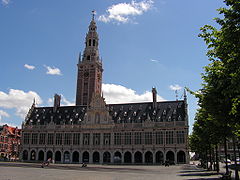“No one after lighting a lamp puts it in a cellar, but on the lampstand so that those who enter may see the light.” [Luke 11:30, NRSV]
(L) Catholic University Leuven Library; (R) Katholieke Universiteit Leuven logo: Seat of Wisdom
At a recent conference in Leuven, Belgium, the point was stressed that we have got it wrong in the Catholic Church, as well as in other churches perhaps, in the way we persuade believers and expend the bulk of our energies in herding them into church to find their spirituality, to be fed by the Word, to be active in ministry and so on, when all this ought in fact first be done in the home. The point is made that unless all this is done in the church of the home, it is not genuinely done at all in Christian life, whether we attend church or not.
All this, to be sure, resonates well with what we ourselves have insisted and proposed at the FABC (Federation of Asian Bishops Conferences) Symposium on Asian Vocations, 22-26 Oct 2007, Sampran, Thailand. There, we were invited to present a paper titled “Family, the Seedbed of Vocations” where “vocations,” for purposes of that symposium coverage, was restricted to those of the priests and the religious. The slogan and the battle cry we proposed in our paper was: “Back to the Family!” Build the family and we build the Church, never the other way around, we insisted. What is required is a concerted programme of family-focus as the new way of being Church.
Last week, the message inherent in our slogan was examined extensively and in depth at an International Conference at the Catholic University of Leuven, 10-13 March 2010. Organised by the INTAMS Chair for the Study of Marriage and Spirituality, the conference theme was “The Household of God and Local Households: Revisiting the Domestic Church.” The first striking aspect of this Conference, which at once doubles its usefulness, was clearly the integration of theory and practice. Present amongst the speakers as well as the participants were theoreticians – the professional theologians who are professors who come from theology faculties worldwide – and practitioners – who actually live the marriage and family life and actively minister in this field in conducting seminars, retreats and workshops to assist others in their marital and familial lives.
We hope to post some commentaries on at least some of the papers presented at the conference when the texts from speakers are made available to us. That may take quite a while though, since usually speakers’ texts are only released in the final book form published by the conference organisers.
In the meantime, while we are in the season of Lent, we thought it might be opportune to introduce to our readers a very seasoned minister in the field of Christian family life who was also at the conference. She is Toni Rowland, who coordinates the Family Life Desk of the SACBC (Southern African Catholic Bishops’ Conference), set up by the bishops in recognition of the strengthening of family life in the home as one of the Church’s pastoral priorities. In addition to conducting workshops for families, she is also producing a periodical magazine and a manual for the Bishops’ Conference related to the Christian family life ministry. A long-time practitioner in the field, she is rich in life experience and practical wisdom. She and her late husband had founded MarFam – Marriage and Family Life Renewal Ministry – which does seminars and workshops and publishes literature. Her series of small books are useful for personal reflection and group workshops. Practitioners in the field of marriage and family life may wish to visit her website at www.marfam.org.za or email her at info@marfam.org.za. Her books may be purchased from Marfam, PO Box 288, Randburg, 2125, South Africa.
In this season of Lent, we thought it might be useful to reproduce (prior permission having been given by Toni) an extract from one of her books titled “The Trouble with Catholics Is …” Through this book, she is inviting Catholics to “look deeply into our souls” to see what it is “in us, about us, with us, that makes us who we are and what we are”. In this season of quiet introspection and penance leading up to the Resurrection Sunday, the list offers timely guide-posts for reflection and perhaps debate. Drawn up in good jest, the list harbours neither malice nor any intention to offend. The way we see it, in reading and taking time to reflect on each item on the list, it might be good to imagine Toni posing questions, rather than delivering judgments, and challenging the readers to perhaps see whether they are reflected in some of the items. And, if indeed they see themselves in anyway implicated in or challenged by any of these items, they can then go on to ask themselves: “What do I need to do about it?” Clearly non-exhaustive, the list is free of prior judgment and intended for personal reflection and group discussions at a coffee-corner somewhere, in the hope that when we renew our baptismal promises this Easter, we may do so with greater conviction and commitment. To be sure, our readers will see many of the themes, common as they are to Christian living anywhere, fleshed out in our future posts.
For now, Toni’s list reads as follows:
“The trouble with Catholics is that ….
Catholics don’t know their faith, don’t understand it, don’t practise and live it.
Catholics don’t find religion interesting enough to bother their heads over it.
People go to Mass, when it suits them, and go home; they’re just benchwarmers and don’t get involved in anything in the community. Sport is more religion than religion is.
…. they, especially the youth and children, find the Mass boring.
…. they believe in or worship saints, especially Mary.
…. they still worship their ancestors even though they are Christians.
The trouble is…. we are divided. There are groups, mini-churches almost, a ‘them’ and ‘us’. We are not open to one another’s views. There are charismatics, Alpha groups, Legion of Mary, family groups like Marriage Encounter and Couples for Christ and any number of sodalities mainly for women.
The trouble is…. Catholics are radically and culturally divided and do things differently.
…. they are divided into religious/clergy and laity with the religious/clergy having a much higher status and being put, or wanting to be put, on a pedestal.
…. they are too strongly chauvinistic/feminist.
The trouble with Catholics is that thy do not integrate their spirituality into their life.
…. they separate faith and life,
…. their religion is private, they are highly individualistic and not intrinsically family-minded. They are highly secularized and materialistic.
The trouble with Catholics is that they have lost the sense of sin, many don’t go to Mass, they practise contraception, divorce, cohabit, practise polygamy, are gay.
…. they look at family members who don’t conform, and they are confused and judge them. And then good, practising Catholics can feel imposed upon about beating one’s breast and saying I have gravely sinned. How do we really feel about our own sinfulness?
The trouble is there is too much focus on the youth/ not enough is done for the youth. Are they the future of the church or not? Where are our young adults?
The trouble with Catholics is that they don’t know how to think for themselves, want to be spoon-fed. They’re dead from the neck down.
The trouble with Catholics is that they have not heard/ listened to/ fully integrated the very rich and meaningful church teaching on marriage and family life which is particularly pertinent for lay people.
The trouble is that they are still unsure about the Church and sexuality.
…. They have not fully taken on board that they are spiritual and physical beings and both are good.
…. As adults they have a static, underdeveloped and immature faith life.
The trouble with Catholics is that they don’t know Jesus; they are unevangelised, don’t know how to pray properly or read the Bible.
We don’t love enough, are not loved enough, are unforgiving.
Religion belongs in the church in the family, the little church of the home.
We don’t understand the meaning of suffering.
We have blind faith in the Holy Spirit for the future of the Church.
The trouble with Catholics is that they have learned to switch off when they see themselves being harangued about money, the poor and social justice.
The trouble with Catholics is that we are called to be true followers of Jesus, priest, prophet and king, who stood up for his beliefs, endured suffering and ended his human life on the cross. That is not anyone’s wish. While we do believe that he rose from the dead and reigns in glory at the right hand of the Father, we don’t see ourselves there. Not just yet.
The trouble is lay people have not received much formation in the recent Church teaching other than their catechism up to confirmation. Some of us may know the SA Constitution, but do we know the Constitution of the Church in the Modern World, Gaudium et Spes? Do we know the Pastoral Plan, the African Synod documents, the document on The Vocation of the Laity? Do the laity want this formation in more up-to-date theology and spirituality? Often the most committed Catholics are the older, or more conservative believers. Is this good or not? Is EWTN forming mature South African Catholics skilling them to deal with local issues like HIV/AIDS, crime and corruption, roles in marriage, confusion over religion and culture?”
What are your thoughts on the items on this list? You may of course add to it for your own meditation and discussions with friends, during this Lenten season and beyond. Complacency and indifference, as we all know, are attitudes that seriously block us from gloriously living out the grace God conferred on us at our baptism. Are there issues over which we feel we ought to repent, before we can properly continue with our Resurrection faith?
Copyright © Dr. Jeffrey & Angie Goh, March 2010. All rights reserved.
You are most welcome to respond to this post. Email your comments to jeffangiegoh@gmail.com. You can also be dialogue partners in this Ephphatha Coffee-Corner Ministry by sending us questions for discussion.


